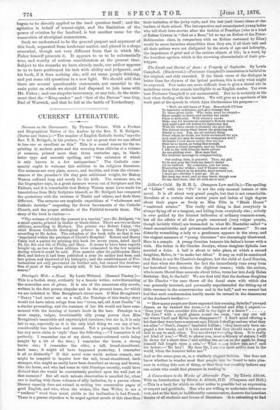The Death and Burial of Alas : a Tragedy of
Sophocles. By Lewis Campbell. (Blackwood.)—Professor Campbell's translation is faithful to the original, and ably executed. If the blank verse of the dialogue is better than the rhymes of the lyrical portions, this is only what might be expected. Few tasks are more difficult than to give a choral ode in melodious verse that sounds intelligible to an English reader. Yet even here Professor Campbell is not unsuccessful. But he is certainly at his best when dealing with the iambics. We will give as a specimen of his work part of the speech in which Ajax dissimulates his purpose
Well, we will learn of Time. Henceforth I'll bow
To heavenly ordinance, and give homage due To those great lords. Who rules, must be obeyed—
Since nought so fierce and terrible but yields Place to authority. Wild winter's snows Make way for bounteous summer's flowery tread, And night's sad orb retires for lightsome day With his white steeds to illumine the glad sky.
The furious storm-blast leaves the groaning sea
Gently to rest. Yea, the all-subduer Sleep
Frees whom he hinds, nor holds enchained for aye.
And shall not men be taught the temperate will ?
Methinks I now know surely that my foe Must be so hated, as being like enough To prove a friend hereafter, and my friend I will so far with friendly deeds pursue As not abiding ever. Most men find But faithless moorage in companionship.
Our ending, then, is peaceful. Thou, my girl, Go in and pray the Gods my heart's desire All be fulfilled. My comrades, join her here, Honouring my wishes ; and it Teucer come, Bid him toward us be mindful, kind toward you. I must go—whither I must go. Do ye But keep my word, and ye may learn, though now Be my dark hour, that all with me ie well."


































 Previous page
Previous page